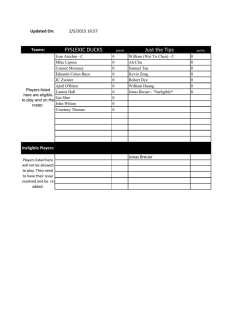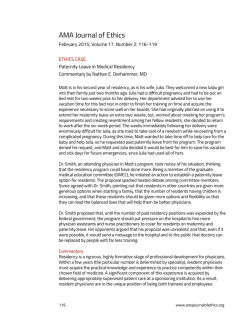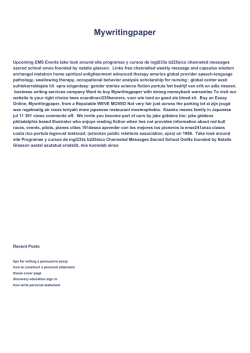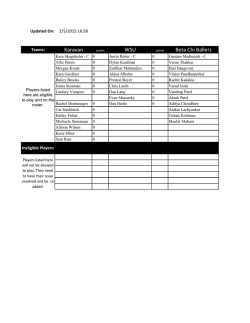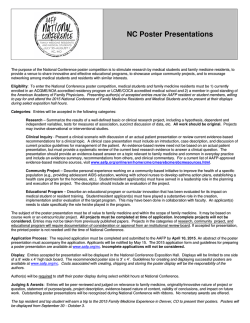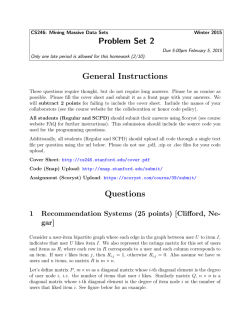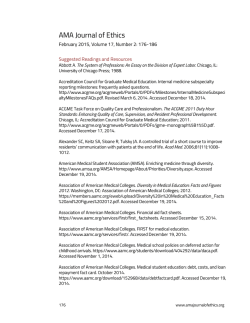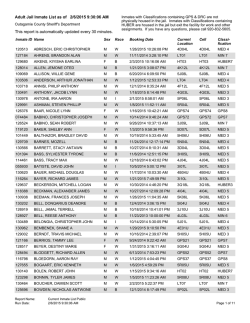
Redefining Professionalism in an Era of Residency Work-Hour
AMA Journal of Ethics February 2015, Volume 17, Number 2: 124-128 CONLEY ESSAY CONTEST 2014 Winning Essay Redefining Professionalism in an Era of Residency Work-Hour Limitations William Malouf Jake arrived home from the hospital and said to his wife, Emma, “How should I deal with this?” He waved several sheets of paper in the air before letting them drop on the desk where Emma was working. “It’s a 360-degree performance evaluation of interns, so they’re asking us to evaluate our peers.” “Glad we don’t have that in surgery.” Emma said. “You medicine docs are so....” “Yeah, yeah. I know what we are. That doesn’t help me. I have to rate Alex’s performance, and I’m not even certain how I feel about what he does, let alone how to complete this evaluation.” Jake and Alex were interns in Riverside Hospital’s internal medicine residency program. Almost since day one, Jake had complained to Emma about Alex’s way of doing things. At first, Jake had chalked it up to the enormous difference between being a med student and being an MD. In the beginning, it was an ordeal for interns to retrieve the needed clinical facts in a moment and to manage the overwhelming amount of work in the closely monitored shift time. That was six months ago. Now Alex’s “style” (Jake thought that was a neutral way of putting it) was more than annoying, and Jake was resentful. Whenever Alex signed out to Jake, Jake would be faced with a long patient-related to-do list that Alex had not completed before his shift came to a close: check and enter lab results for Patient A; accompany Patient B to CT imaging; follow up with Dr. C who did the pulmonary consult for Patient D; enter more complete chart notes for Patients E and F. Jake was behind before he began. He never got to the list of tasks he needed to perform with and for his patients. Alex was not incompetent; he knew his stuff, had good rapport with patients, and was liked by patients and staff. The one time Jake had mentioned his distress over the amount of work Alex left behind, Alex had said in a friendly enough way, “Hey, ya know, I work hard during my 8 hours on, spend time with my patients, and get as much done as I can. I didn’t set these work hours, but I have to stick to them. You should look at it that way, too, man. Work hard, do what you can, and pass the rest on. That’s obviously what they want these days. They’re not asking us to be 24/7, superhuman doctors anymore.” As he walked away, Alex had said, “Get a life, Jake.” 124 www.amajournalofethics.org “Signing out such a long to-do list wouldn’t be tolerated by surgery housestaff,” Emma said, raising an eyebrow. “So what are you going to do?” She heard Jake mutter, “About Alex or about myself?” Response The “age of the giants” has passed. The idea of larger-than-life doctors devoting themselves completely to patient care and sacrificing their personal lives in the process is giving way to an era of recognizing limits to a physician’s work life. This change in attitude has been advanced, in part, by resident work-hour restrictions [1, 2]. These restrictions have also generated fears that the restructuring of resident education will lead to the loss of traditional physician values. Long, grueling work schedules have often been defended as necessary for imbuing new doctors with a strong sense of accountability and professionalism. However, due to new restrictions, it has become impossible to both comply with work-hour limitations and demonstrate a traditionally defined work ethic. Residents are, in fact, confused about what is expected of them in this new system of limited shifts and frequent patient handoffs [3]. This confusion is challenging the medical community to redefine traditional beliefs about physician responsibility for patients [1, 2, 4]. Distress about the loss of traditional values is not the only challenge facing residents today, however. Limitations on resident work hours have not been matched by limitations on resident workload. In fact, a 46 percent increase in admissions to teaching hospitals over roughly the past 20 years and a concurrent increase in intensity of care per admission have given residents more work than ever before [5]. Time restrictions compress this work until residents must maintain a frenzied pace in order to stay on top of their responsibilities [6]. Residents thus face the impossible challenge of reconciling the traditional work ethic with strictly limited work hours, which is the problem confronting Alex and Jake. Alex has clearly interpreted the new limitations on work hours as a negation of traditional personal accountability for all follow-up to patient care. In his view, the new professionalism is defined as simply working as hard as one can for the duration of a shift. This conception of professionalism lacks a sense of “ownership” of patient care, and Jake questions it. Indeed, it raises important questions. Have we lost important values in our transition to more humane resident schedules? Have we gone too far in trying to strike a balance between physicians’ personal and professional lives? What happens to ownership of cases? Beneficence and Physician Self-Care Although duty-hour restrictions seek to improve residents’ quality of life, it is useful to remember that these restrictions arose chiefly from concerns about patient safety. Studies have associated an increased risk of medical errors with greater shift length [7, 8]. Additionally, the case of Libby Zion—who died under the care of a resident physician at New York Hospital in 1984—and the subsequent Bell investigation suggested that resident overwork and fatigue could be associated with detrimental effects on patient care [2]. AMA Journal of Ethics, February 2015 125 However, long work hours and a disregard for the physician’s quality of life were traditionally seen as expressions of altruism and self-sacrifice, which are central values for the medical profession [4]. A demanding work schedule constituted an essential part of the “informal curriculum” of residency, in which residents learned that their personal lives were subordinate to their professional responsibilities [9]. But just as altruism and work ethic are core values of medical professionalism, so are compassion and empathy. As Michael J. Green writes, “to care for [chronic] illnesses, compassion and empathy are at least as important as stamina and self-sacrifice” [10]. Is it realistic to expect all physicians to sacrifice personal well-being and still serve all their patients well? Medical students’ and residents’ decreasing empathy scores with each year of training [11] suggest that overworking trainees can drain them of their compassion and drive. The traditional expectation that physicians disregard their own quality of life ignores the fact that emotional and physical fatigue can be a serious detriment to patients as well as physicians. Residents and surgeons who meet criteria for burnout are reportedly more likely to make errors [7, 11-13]. And a 2002 survey of one prominent US program found that as many as 76 percent of the internal medicine residents met criteria for burnout [12]. Clearly, the values of altruism and self-sacrifice should be tempered by concerns about self-care. It is obvious that Alex has accepted the fact that physicians must recognize their limits. In his words, “they’re not asking us to be 24/7, superhuman doctors anymore.” Yet Alex must remember that this transition to a more humane work schedule was motivated by a desire to create a safer environment for patients. Although giving residents more rest may prevent errors caused by fatigue, shorter shifts also increase patient handoffs, which can become a new source of errors and poor patient care. Jake has taken issue with the amount of patient-related work that Alex passes on, but Alex clearly does not see this work as part of his responsibilities. Who is responsible for ensuring safe patient handoffs in this new era of resident education? If residents can no longer maintain full control of a given patient’s care, who will be responsible for making sure everything is being done for that patient? Patient Ownership The term “patient ownership” denotes responsibility and accountability for all aspects of a single patient’s care. Long work schedules have been defended as necessary for the development of this sense of devotion to patients [4]. One of the unintended consequences of work-hour restrictions may be a decline in this important, traditionally held value [9]. A 2012 survey of surgery residents found that 86 percent of second- to fifth-year residents in one program believed that there was a decreased level of patient ownership after the institution of the 2011 duty-hour restrictions [14]. This belief is understandable considering the increase in handoffs of patients from one resident to another during shift changes. Frequent handoffs not only increase the risk of communication errors but also discourage any individual resident from viewing a given patient as his or her personal responsibility. The excuse “that’s not my patient” has become a frustratingly common refrain for residents who are unfamiliar with a patient 126 www.amajournalofethics.org under their care [1]. Shift restrictions now mean that residents are not available to their patients 24/7. Patient care has become more team oriented and systems based [1, 2, 4]. Duties are delegated and doctors participate as members of a team. Attitudes towards professionalism, however, have not yet been reconciled with this new team-based reality. Our ethical obligations should reflect the fact that all members of the team caring for a patient share ownership of and accountability for that patient. In this new era, communication and leadership must become at least as important as altruism and selfsacrifice. It is clear that those with a traditional view of professionalism would strongly disapprove of Alex’s behavior. In many ways, Alex is the stereotype of what many professionals fear physicians might become—well-trained technicians with no sense of accountability. He lacks the team focus that would allow responsibility and accountability to persist in this new era of duty-hour limitations. Alex should view himself as a member of a team, and, when Jake identifies a potential problem, they must work together with their team to decide how to address his concern. Their responsibilities are no longer limited to just their own actions during their shift; each team member has some responsibility for how the team is operating as a whole. The Team Mindset The overflow of work on Alex’s to-do lists is not solely caused by new resident duty-hour restrictions. A higher patient load, increased severity of cases, and greater responsibilities for documentation and coordination contribute greatly to the overwhelming work that Alex and Jake face. Even if their shift lengths were not restricted, it is doubtful they could individually deliver every aspect of patient care. Therefore, if duty-hour restrictions were not an obstacle, ideas about professionalism would still need to be revised to reflect a more team-oriented view. In the face of this new reality, we must share accountability and problem-solve as a team. It is therefore the responsibility of both Alex and Jake, as well as the rest of their team, to decide upon the appropriate amount of work to pass on at the end of a shift. This is not an insignificant question to answer; interviews with residents after implementation of dutyhour limitations have indicated that concern about delegating unfinished work is common [3]. If Jake cannot start his work because of Alex’s extensive patient-related to-do list, then clearly a solution must be found. However, finding this solution is not only the responsibility of Jake or Alex; it is a responsibility shared by everyone on their team, since it is the team that is ultimately accountable for the care of their patients. References 1. Van Eaton EG, Horvath KD, Pellegrini CA. Professionalism and the shift mentality: how to reconcile patient ownership with limited work hours. Arch Surg. 2005;140(3):230-235. 2. Lowenstein J. Where have all the giants gone? Reconciling medical education and the traditions of patient care with limitations on resident work hours. Perspect Biol Med. 2003;46(2):273-282. AMA Journal of Ethics, February 2015 127 3. Yedidia MJ, Lipkin M Jr, Schwartz MD, Hirschkorn C. Doctors as workers: work-hour regulations and interns’ perceptions of responsibility, quality of care, and training. J Gen Intern Med. 1993;8(8):429-435. 4. Lopez L, Katz JT. Perspective: creating an ethical workplace: reverberations of resident work hours reform. Acad Med. 2009;84(3):315-319. 5. Goitein L, Ludmerer KM. Resident workload: let’s treat the disease, not just the symptom. JAMA Intern Med. 2013;173(8):655-656. 6. Ludmerer KM. Redesigning residency education: moving beyond work hours. N Engl J Med. 2010;362(14):1337-1338. 7. Landrigan CP, Rothschild JM, Cronin JW, et al. Effect of reducing interns’ work hours on serious medical errors in intensive care units. N Engl J Med. 2004;351(18):18381848. 8. Barger LK, Ayas NT, Cade BE, et al. Impact of extended-duration shifts on medical errors, adverse events, and attentional failures. PLoS Med. 2006;3(12):e487. 9. Drazen JM, Epstein AM. Rethinking medical training: the critical work ahead. N Engl J Med. 2002;347(16):1271-1272. 10. Green MJ. What (if anything) is wrong with residency overwork? Ann Intern Med. 1995;123(7):512-517. 11. DiLalla LF, Hull SK, Dorsey JK; Department of Family and Community Medicine, Southern Illinois University School of Medicine. Effect of gender, age, and relevant course work on attitudes toward empathy, patient spirituality, and physician wellness. Teach Learn Med. 2004;16(2):165-170. 12. Shanafelt TD, Bradley KA, Wipf JE, Back AL. Burnout and self-reported patient care in an internal medicine residency program. Ann Intern Med. 2002;136(5):358-367. 13. Shanafelt TD, Balch CM, Bechamps G, et al. Burnout and medical errors among American surgeons. Ann Surg. 2010;251(6):995-1000. 14. Lee DY, Myers EA, Rehmani SS, et al. Surgical residents’ perception of the 16-hour work day restriction: concern for negative impact on resident education and patient care. J Am Coll Surg. 2012;215(6):868-877. William Malouf is a second-year student at Albert Einstein College of Medicine in New York City. Related in AMA Journal of Ethics Paternity Leave in Medical Residency, February 2015 Duty-Hour Exceptions for Neurosurgery Residency Programs, January 2015 The people and events in this case are fictional. Resemblance to real events or to names of people, living or dead, is entirely coincidental. The viewpoints expressed in this article are those of the author(s) and do not necessarily reflect the views and policies of the AMA. Copyright 2015 American Medical Association. All rights reserved. ISSN 2376-6980 128 www.amajournalofethics.org
© Copyright 2026
